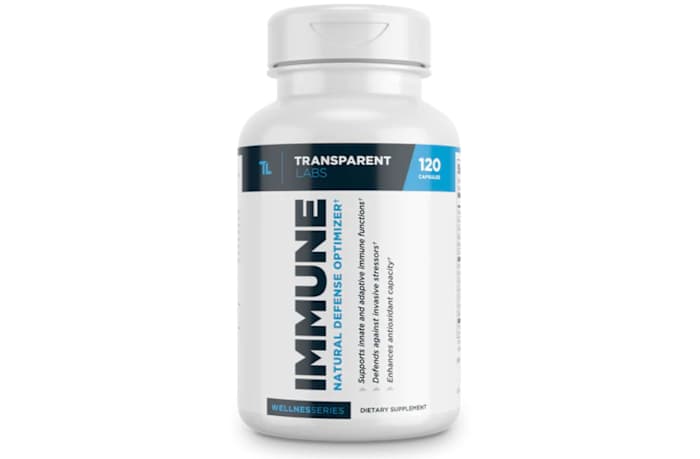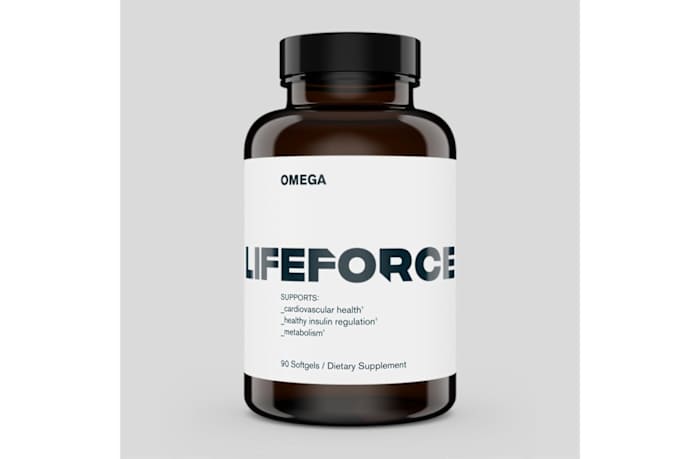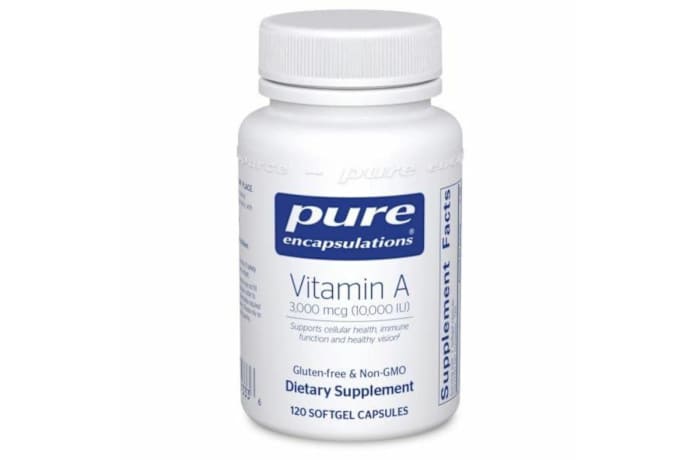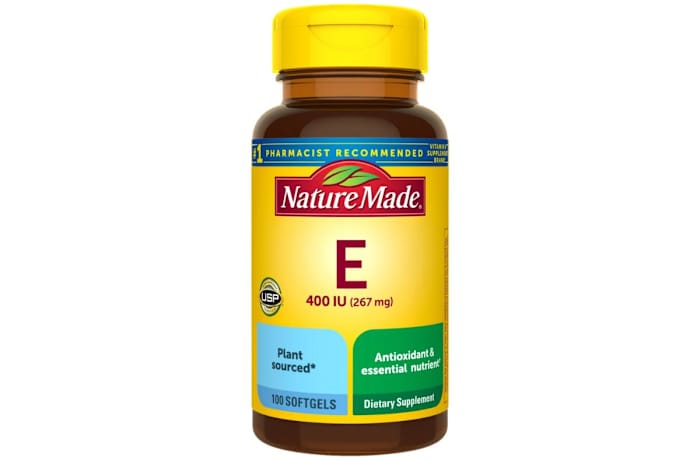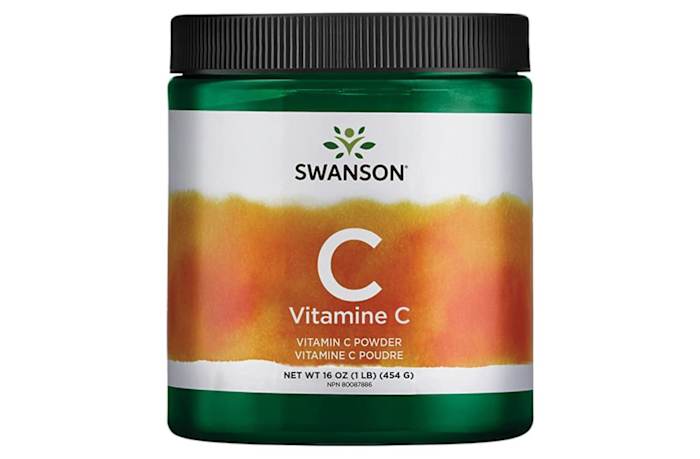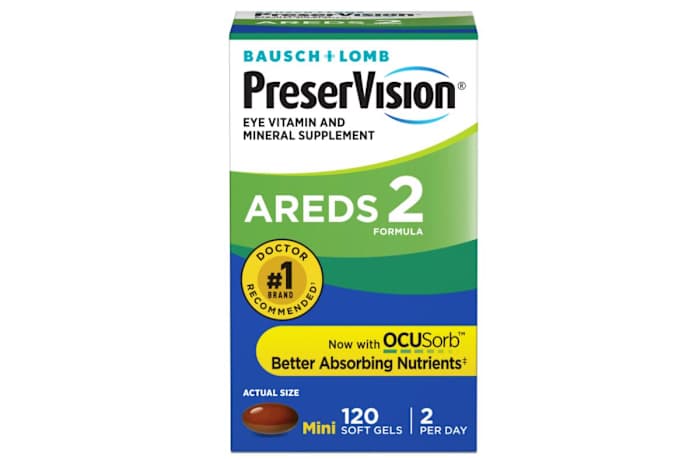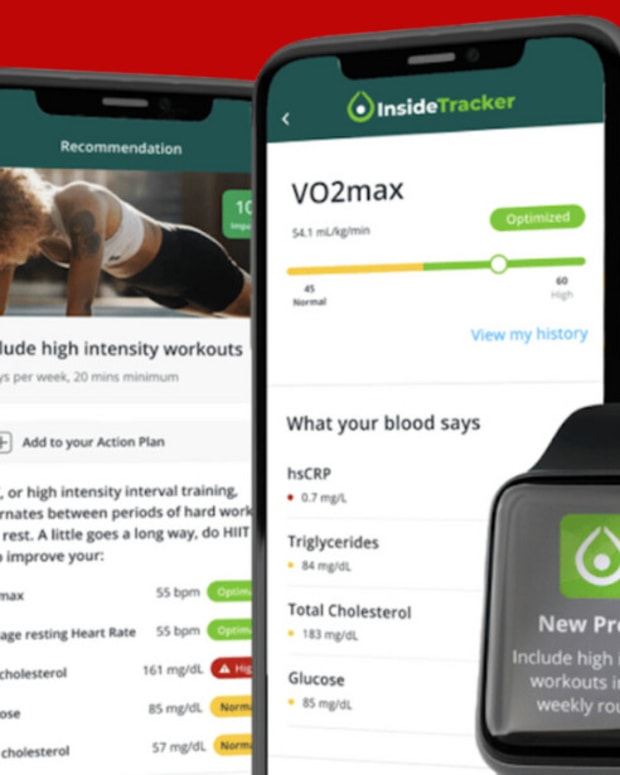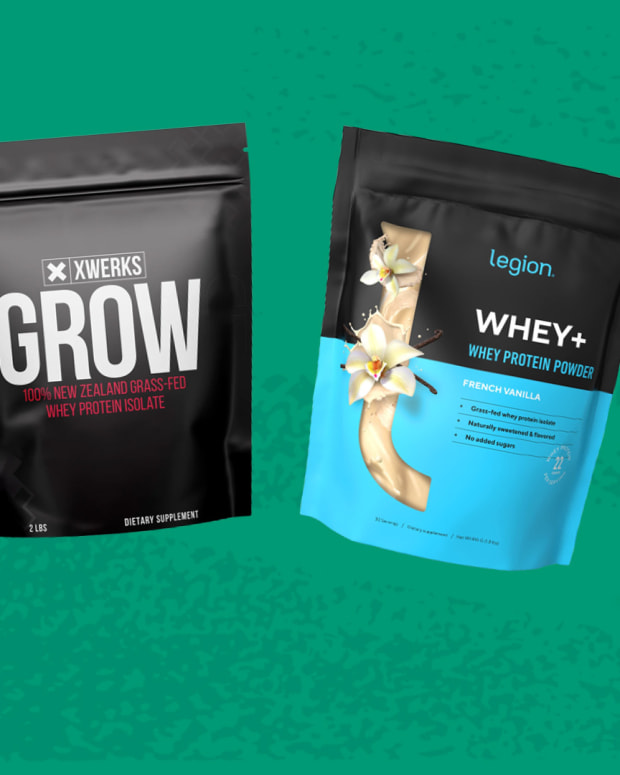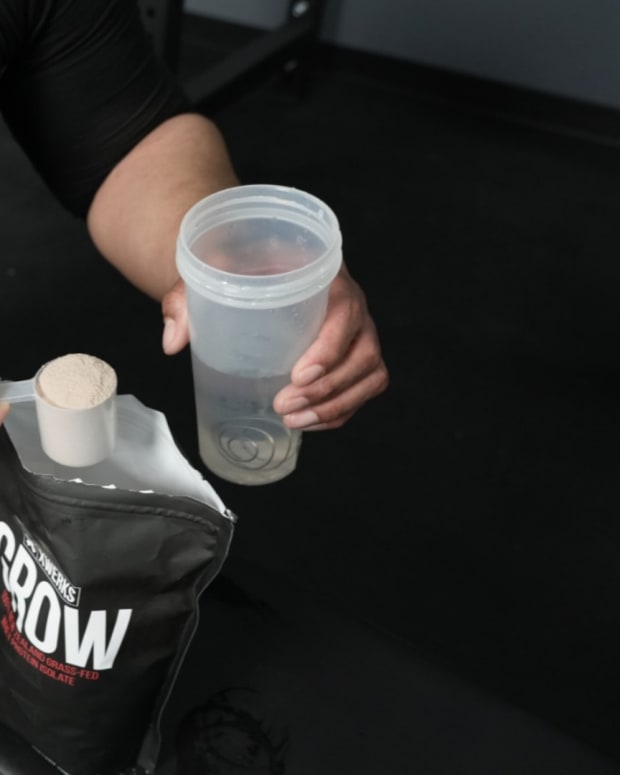The products featured in this article have been independently reviewed. When you buy something through the retail links on this page, we may earn commission at no cost to you, the reader. Sports Illustrated editorial staff are not involved in the creation of this content. Learn more here.
Across industries, it’s estimated that 92% of jobs now require some form of work using computer screens. Constant exposure to artificial blue light from computer screens, TV, smartphones and tablets could affect your eye health.
The eye receives incoming light and sends signals to the brain to form images. Since the eye structures are directly exposed, they are at risk of light-induced damage. It is generally accepted that low levels of light are harmless, but the long-term effects of light from digital sources are unknown. In mice, overexposure has led to premature cell death and cornea damage.
The good news is that dietary nutrients can protect your vision. Vitamins for eye health are particularly important for delaying or preventing age-related diseases, such as cataracts, diabetic retinopathy, glaucoma and age-related macular degeneration (AMD).
This article lists the six best eye vitamins and their benefits. You’ll learn how supplements affect your vision, what drawbacks to consider and which products are right for you.
This content is meant to be informative, but should not be taken as medical advice. It is not intended for use as diagnosis, prevention or treatment of health problems. Always speak with your doctor before starting any new supplement or exercise regimen.
Our Picks for the Best Vitamins for Eye Health:
- Best Zinc: Transparent Labs Immune
- Best Omega-3 Fatty Acids: LifeForce Omega
- Best Vitamin A: Pure Encapsulations Vitamin A
- Best Vitamin E: Nature Made Vitamin E
- Best Vitamin C: Swanson Vitamin C Powder
- Best Lutein and Zeaxanthin: PreserVision AREDS 2 Eye Vitamin & Mineral Supplement
Best Zinc: Transparent Labs Immune
Key features and specs
- Percent of daily value: 136 percent of the recommended daily value of zinc
- Zinc per serving: 15 milligrams of zinc, as L-OptiZinc L-methionine
- Nutrition facts: 0 calories
- Certifications: Manufactured in GMP-certified facilities and NSF-Certified for Sport
- Subscription: Save 10% when purchased in the Wellness stack subscription
- Key ingredients: Zinc, vitamin C, vitamin D, vitamin B12, magnesium, quercetin and organic reishi mushroom; plus proprietary blends including EpiCor ® dried yeast fermentate, CurcuWIN Ultra+ ® turmeric extract, BioPerine ® (black pepper fruit extract) and Gingever ® ginger root extract
- Best for: People diagnosed with low zinc levels or risk of deficiency, including vegetarians, seniors and those that over-consume alcohol
- Price per serving: $0.67
Transparent Labs is a sports nutrition company that believes in clean, natural ingredients with transparent labeling. That is one reason whyTransparent Labs’ Immune supplement is our top zinc supplement for eye health. Another is that it also contains powerful nutrients that complement zinc, including BioPerine, which aids in the absorption of zinc and vitamin D, which has shown promise in preventing ocular diseases like AMD, diabetic retinopathy (DR) and dry eye syndrome (DES).
Immune includes L-methionine, a zinc form with a 16 percent higher absorption capacity than other types. Most people get enough zinc through their diet; the recommended daily requirement for women is 8 milligrams and 11 milligrams for males.
Immune contains four capsules, each having 3.75 milligrams of zinc. Customers who have reviewed Immune also say Transparent Labs provides excellent customer service.
Related Post: The Best Zinc Supplements for Your Immune System
What we love:
- Zinc-L-methionine has superior bioavailability
- BioPerine to enhance zinc absorption
- NSF-Certified for Sport
What to consider:
- Serving size is four capsules daily
- Only bulk orders >$149 are eligible for free shipping
Best Omega-3 Fatty Acids: LifeForce Omega
Key features and specs
- Percent of daily value: 100 percent recommended daily intake for omega-3 fatty acids; there is no recommended daily allowance for EPA/DHA
- Omega-3 fatty acids per serving: 1000 milligrams
- Nutrition facts: 30 calories, 2 grams of fat, 0.5 grams of protein, 0 grams of sugar
- Certifications: Made in a NSF-certified GMP facility
- Subscription: Subscribe and save 20%
- Key ingredients: 1.5 grams of proprietary MaxiSimil Fish Oil made up of 1000 milligrams of fish oil, 670 milligrams of Epio Pentanoic Acid (EPA) and 300 milligrams of Docosahexaenoic Acid (DHA), 100 milligrams of gamma linolenic acid, 375 milligrams of SmartPrime-Om Complex, 100 milligrams of omega-7, 35 milligrams of omega-3; other ingredients include gelatin, glycerin, purified water, sunflower lecithin and sesame
- Best for: Those who have high cholesterol or a history of heart disease, do not like to eat seafood and individuals with rheumatoid arthritis
- Price per serving: $2.50
LifeForce Omega is a fish oil blend that includes EPA and DHA at a 5:2 ratio to support eye health. Research shows those who consume more fatty fish and omega-3s in their diets have a 38 to 53 percent lower chance of developing AMD (age-related macular degeneration). Researchers have also suggested that omega 3s relieve dry eyes, particularly EPA and DHA. Yet, doctors at the National Institutes of Health warn that fish oil naturally prevents blood from clotting. It’s best to talk to your healthcare provider before starting fish pills if you take blood thinners or have an increased risk of bleeding.
This supplement also includes 100 milligrams of gamma linolenic acid, an omega-6 fatty acid that plays a crucial role in growth and development, supports hair and skin growth, bone and brain health and helps regulate the metabolism and reproductive systems. This specific fatty acid is essential for health and is not naturally produced by the body, so it must be consumed through food or supplements.
While this supplement has a higher price of $2.50 per serving, LifeForce offers a 20% discount for subscribers who choose to receive Omega monthly, bringing the price down to $1.83 per serving.
Related Post: The Best Fish Oil and Omega-3 Supplements, According to a Nutritionist
What we love:
- Contains 1000 milligrams of fish oil to support eye health
- Formulated with two of the main omega-3 fatty acids—EPA and DHA
- Subscribers can save 20%
What to consider:
- Expensive
- Instructions recommend taking with food
Best Vitamin A: Pure Encapsulations Vitamin A + Carotenoids
Key features and specs
- Percent of daily value: 167 percent of the recommended daily value of vitamin A
- Vitamin A per serving: 1,500 micrograms of Vitamin A (as vitamin A acetate)
- Nutrition facts: Calories 0 grams, Sugar 0 grams
- Certifications: Compact by Design (Certified by Amazon); NSF-GMP registered in the U.S.; Certified gluten-free by Gluten-Free Certification Organization (GFCO)
- Subscription: Save 10% with a monthly subscription
- Key ingredients: Vitamin A 1,500 micrograms, FloraGlo ® lutein 3 milligrams, Zeaxanthin 500 micrograms, AstaReal ® Astaxanthin 500 micrograms; other ingredients include red beetroot powder and cellulose capsule
- Best for: Adults with a poor or limited diet, or with a condition that increases the demand for vitamin A, such as pancreatic ailments, vision disorders or measles
- Price per serving: $0.33
Pure Encapsulations, owned by Nestle Health Sciences, claims to be the most recommended supplement brand among healthcare professionals. Based on its composition and quality, Pure Encapsulations Vitamin A + Carotenoids is our pick for the best vitamin A. The company maintains strict quality control and follows Good Manufacturing Practices (GMP) for purity and quality.
Vitamin A, also called retinol or retinoic acid, is essential for good vision. Pure Encapsulations Vitamin A contains 167 percent of the daily recommended dose, plus a carotenoid blend of zeaxanthin, lutein and astaxanthin. Lutein and zeaxanthin form a natural blue light filter to protect the eyes from sun damage and astaxanthin prevents oxidative stress.
Vitamin A supplements are safe at low levels but may interact with certain medications. When taken with retinoids to treat acne, blood levels can become dangerously high. Taking over 10,000 micrograms daily could lead to brittle bones and liver damage.
Online reviews of Pure Encapsulations A + Carotenoids are overwhelmingly positive, with 4.7/5 from 175 reviews on Amazon. One user confirmed that her doctor insisted on this brand since it’s as “pure as it can get.” That said, the Vitamin A and zeaxanthin in this product are artificial. Each bottle of Pure Encapsulation contains a three-month supply of 90 capsules for around $30.00. The recommended dose is one capsule daily with a meal.
What we love:
- Third-party tested
- Vegetarian friendly
- Allergen-free
- Added carotenoid blend of lutein, zeaxanthin and astaxanthin
What to consider:
- Vitamin A and zeaxanthin are synthetic
Best Vitamin E: NatureMade Vitamin E
Key features and specs
- Percent of daily value: 1780 percent of the recommended daily value of vitamin E
- Vitamin E per serving: 267 milligrams (400 International Units) of vitamin E as d-alpha tocopherol per capsule with other mixed tocopherols
- Nutrition facts: 0 calories
- Certifications: USP verified for quality
- Subscription: Save 10% and get free shipping with monthly subscription
- Key ingredients: Vitamin E; other ingredients include gelatin, soybean oil, glycerin, mixed tocopherols
- Best for: Anyone who wants to supplement their diet with a natural plant-based form of vitamin E, especially those with Crohn’s disease, liver disease, short-bowel syndrome and other gastrointestinal conditions that impair vitamin absorption
- Price per serving: $0.19
NatureMade is touted as the number one choice of surveyed pharmacists. NatureMade Vitamin E is an affordable, high-quality supplement and our choice for the best vitamin E for eye health. It provides the most absorbable form: d-alpha tocopherol. This vitamin comes in an easy-to-swallow soft gel capsule from naturally-sourced vitamin E.
Vitamin E guards against central vision loss and AMD. Yet, this supplement is one everyone should consider adding since surveys show that 89.8 percent of men and 96.3 percent of women aren’t getting enough alpha-tocopherol in their diet.
NatureMade vitamin E is rated highly in online reviews. Customers report that smaller soft gels are easier to take than other brands. When shopping for this product, note that NatureMade also sells vitamin E “dl” alpha-tocopherol instead of “d” alpha-tocopherol. The “dl” indicates that it is a man-made or synthetic form instead of the natural plant-sourced form.
Related Post: The 9 Best Vitamin E Supplements for Skin and Eye Health
What we love:
- Recommended by pharmacists
- USP-verified for quality
- Most bioavailable form (d-alpha tocopherol)
- Affordable
What to consider:
- Contains gelatin, not suitable for vegans
Best Vitamin C: Swanson Vitamin C Powder
Key features and specs
- Percent of daily value: 1,111 percent of the recommended daily value of vitamin C
- Vitamin C per serving: 1000 milligrams
- Nutrition facts: 0 calories
- Certifications: Non-GMO, vegan, tested for purity and potency
- Subscription: Subscribers save 40% on the first shipment and 15% on future orders
- Key ingredients: 1000 milligrams of Vitamin C, 200 milligrams of rose hips
- Best for: Those over 60 years of age, diabetics and anyone with cataracts; also smokers, anyone exposed to second-hand smoke and people with a limited diet or that don’t eat 2–3 servings of fruits and vegetables daily
- Price per serving: $0.08
Swanson is a wellness brand that makes health products such as vitamins and supplements for those just starting out and even extreme athletes. The brand requires documentation from each supplier, including a certificate on analysis, for each ingredient included in its supplements. That said, Swanson’s Vitamin C Powder is our recommendation for the best vitamin C for anyone looking to maintain eye health.
Vitamin C, or L-ascorbic acid, is a water-soluble nutrient we need to get from food since our bodies can’t make it. This vitamin is a powerful antioxidant, absorbing toxic free radicals to prevent or minimize cell damage. In studies, vitamin C was shown to protect against lens damage, reduce the risk of age-related macular degeneration (AMD) by 25 percent and reduce the risk of cataracts by 45 percent. There are also 200 milligrams of rose hips—also a source of ascorbic acid—included in this formula which has been shown to support skin health.
Reviewers on the Swanson website give the Vitamin C Powder 4.5/5 stars. Positive reviews mention it’s easy to add to protein shakes and other beverages. Each bottle contains 200 servings and Swanson offers a 100 percent money-back guarantee if you are not satisfied within 30 days.
What we love:
- Price per serving of $0.08 is budget friendly and there are 200 servings per container
- Just two ingredients
- Contains 1,111 percent of the RDI of vitamin C
What to consider:
- Some reviews mention it doesn’t mix well in cold beverages
- Powder may not be ideal for those looking for capsule or pill form to take on the go
Best Lutein and Zeaxanthin: PreserVision AREDS 2 Eye Vitamin & Mineral Supplement
Key features and specs
- Percent of daily value: A recommended daily value for lutein and zeaxanthin has not been established
- Lutein and zeaxanthin per serving: 5 milligrams of lutein and 1 milligram of zeaxanthin
- Nutrition facts: Less than 5 calories and less than 0.5 grams of fat
- Certifications: Only supplement on the list approved by the FDA for early to moderate dry macular degeneration
- Subscription: Save 5 to 15% with Amazon delivery
- Key ingredients: Lutein, zeaxanthin, zinc, copper, vitamin C and vitamin E
- Best for: People with intermediate or late stage AMD
- Price per serving: $0.56
Bausch + Lomb partnered with the National Eye Institute in 2013 for the second Age-Related Eye Disease Study (AREDS2) to see if a high-dose vitamin formula would affect AMD. The good news? Researchers found that the AREDS2 formula slowed the disease by 25 percent. Lutein and zeaxanthin are two key nutrients in the supplement formulation from that clinical trial.
PreserVision AREDS2 is the only product on our list to be approved by the FDA to treat early to moderate dry macular degeneration. It remains one of the most frequently recommended eye vitamins by ophthalmologists.
One capsule twice a day with a meal is the suggested dose. Customers like the small soft gels, which have received 4.6/5 stars from over 4900 reviews on Amazon. A few reviewers complained of nausea and constipation while taking this supplement. Nonetheless, thousands of delighted buyers say this product helped slow their eye diseases, including macular degeneration.
What we love:
- Recommended by eye doctors
- Approved by the FDA
- Formula contains 6 vitamins for vision support
- Proven to slow macular degeneration
What to consider
- Contains Red Dye No. 3
Benefits of Vitamins for Eye Health
Vitamins are vital for healthy eyes. Experts have linked eye-friendly micronutrients to a lower risk of major eye diseases like age-related macular degeneration and cataracts. Vitamins important for eye health include the following:
- Vitamin A is essential for good vision. It helps protect the cornea and promotes night vision. Vitamin A deficiency leads to night blindness and dry eyes.
- Vitamin C is used to build blood vessels and other eye structures. It also protects the eyes from damage from exposure to pollutants such as smoke.
- Vitamin E improves circulation in the eyes and protects the retina from oxidation damage.
- Zinc is vital for sustaining retina health. It also works as an antioxidant and is used to produce enzymes necessary for eye function.
- Lutein and zeaxanthin are found in the eye’s lens, macula and retina. It’s believed that they absorb incoming blue light and limit retina damage.
- Omega-3 fatty acids have anti-inflammatory effects that aid in preventing eye disease. A review of 31 studies suggested that diets high in oily fish protect against diabetic retinopathy.
Individual vitamin needs vary depending on age and other factors. Consult the Vitamin and Mineral Supplements Fact Sheets from the National Institutes of Health for specific recommendations on each vitamin.
Common Eye Conditions Affected By Vitamins and Nutrition
While many factors contribute to eye disease, nutrition plays a significant role. Some vitamin deficiencies have been linked to vision loss.
Vitamin A deficiency is one of the most common causes of blindness. An early indicator of low vitamin A is dry eyes or an inability to produce tears. Extremely low levels can cause dying corneas or total blindness. Severe vitamin E deficiency may also lead to retinal degeneration and blindness.
Low levels of carotenoids, including lutein and zeaxanthin, are associated with chronic eye diseases, including diabetic retinopathy and age-related macular degeneration.
Vitamins vs Food for Eye Health
Nutritional supplements and nutrients from whole foods both promote overall health. Yet, they differ in a few ways.
Vitamin supplements provide a concentrated dose of certain nutrients, making it easy to meet daily requirements. They help those with dietary restrictions, limited food options, or trouble getting particular nutrients from their diet. However, relying solely on supplements is not ideal.
Whole foods are a complex combination of minerals, fiber and other nutrients that work together to support eye health. They offer a more natural and balanced approach. Often, the body can break down, absorb and use nutrients from food more effectively. In addition, fruits and vegetables contain phytochemicals and other antioxidants for healthy eyes.
Based on the AREDS results, the American Optometric Association (AOA) and the American Academy of Ophthalmology (AAO) suggest the following whole foods for eye health.
- Green, leafy vegetables are rich in lutein, zeaxanthin and vitamin A.
- Fruits, particularly citrus fruits, are loaded with vitamin C, while persimmons and tangerines have high levels of lutein and zeaxanthin. Mangos and papayas are high in vitamin A.
- Nuts and seeds contain zinc and vitamin E.
- Fish is the best source of omega-3 fatty acids.
A diversified diet rich in fruits, vegetables and lean proteins helps ensure adequate nutrition for eye health.
Best Eye Vitamins FAQs
Are eye vitamins worth taking?
Yes, eye vitamins may have long-term effects on your vision health. In some people, vitamins could prevent or slow the progression of eye problems like cataracts, dry eyes, retinopathy and macular degeneration.
Can eye vitamins help with blurry vision?
Yes, eye vitamins and supplements are beneficial to overall eye health. Clinical research shows that lutein lessens the occurrence of hazy, blurred vision caused by cataract-induced lens clouding.
What are the best eye vitamins for dry eyes?
Vitamin A is the best vitamin for dry eyes because it stimulates tear production, alongside Vitamin B12, which tends to reduce the sensation of burning eyes.
Can you take anything to naturally improve eyesight?
While there is no magic cure to improve your eyesight naturally, you can maintain your eyesight with healthy nutrition and dietary supplements for deficiencies. Eat a healthy diet rich in dark, leafy greens, fruits and fish high in omega-3 fatty acids.
Final Thoughts
Adding the right vitamins into your daily routine might improve your overall eye health. Science suggests that certain vitamins can maintain visual acuity. They may also prevent cataracts, age-related macular degeneration, diabetic retinopathy and dry eyes.
The top eye vitamins discussed in this article, such as Vitamin A, Vitamin E, Vitamin C, zinc and Fish Oil, each provide unique advantages for eye health. When choosing the best eye supplement for your needs, keep these top six vitamins, their benefits and user evaluations in mind.
Prices are accurate and items in stock as of publish time.

